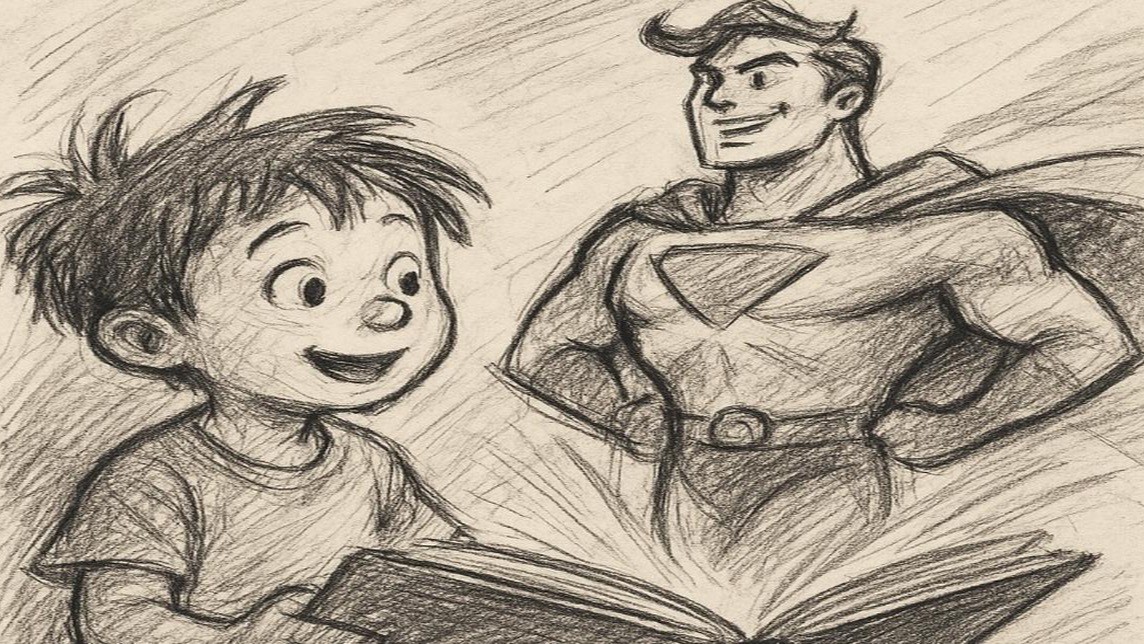Mythologist Joseph Campbell once said, “the goal of the hero’s journey… is finding yourself.”¹
For a child, seeing themselves reflected in the pages of a book can be transformative. They’re not just reading stories—they’re imagining futures. It’s a powerful, life-changing message for an impressionable mind.
Here are a few reasons why every child deserves to read stories where they are the hero.
1. Forms Identity
According to developmental psychology, children begin forming a sense of self and agency early in life, and stories provide a rich landscape for exploring and nurturing identity.² When a child identifies with
a protagonist, especially one who overcomes challenges or grows through adversity, it reinforces a positive self-concept. As Bishop (1990) famously argued, books act as “mirrors” that reflect readers’ own
lives and “windows” that help them understand others. For too many children, the mirror has been missing.³ Seeing oneself as the central figure in a story helps validate personal experience and identity.
a protagonist, especially one who overcomes challenges or grows through adversity, it reinforces a positive self-concept. As Bishop (1990) famously argued, books act as “mirrors” that reflect readers’ own
lives and “windows” that help them understand others. For too many children, the mirror has been missing.³ Seeing oneself as the central figure in a story helps validate personal experience and identity.
2. Motivates Reading Engagement
Children are more likely to enjoy and persist with reading when they can relate to the characters.⁴ When students connect emotionally with a story, their comprehension improves, and so does their willingness
to read for pleasure.⁵ Feeling like the hero gives reading purpose and transforms the child from a passive observer into an active participant in the narrative.
to read for pleasure.⁵ Feeling like the hero gives reading purpose and transforms the child from a passive observer into an active participant in the narrative.
3. Develops Agency and Resilience
Stories that center the child as the hero often depict journeys filled with obstacles, decisions, and transformations. These narratives allow the reader to experience perseverance, critical thinking, and emotional
regulation.⁶
regulation.⁶
When children see characters like themselves facing fears, standing up for others, or solving problems, they internalize those behaviors as possible realities for themselves. This is especially important in a
time when many children feel overwhelmed by forces beyond their control. Heroic narratives can empower them to believe that change is possible, and that they are not just along for the ride but can be
drivers of their own story.⁷ Ultimately, fiction becomes a rehearsal for real-life situations.
time when many children feel overwhelmed by forces beyond their control. Heroic narratives can empower them to believe that change is possible, and that they are not just along for the ride but can be
drivers of their own story.⁷ Ultimately, fiction becomes a rehearsal for real-life situations.
4. Fosters Empathy and Inclusivity for All Readers
When children can step into the shoes of someone courageous, kind, or clever - and often shoes of someone who looks like them - the result is not just confidence, but a wider understanding of the world and
their place in it.⁸
📚References
their place in it.⁸
📚References
- Campbell, J. (1949). The hero with a thousand faces. Pantheon.
- Harter, S. (2012). The construction of the self: Developmental and sociocultural foundations (2nd ed.). New York: Guilford Press.
- Bishop, R. S. (1990). Mirrors, windows, and sliding glass doors. Perspectives: Choosing and Using Books for the Classroom, 6(3).
- McNair, J. C. (2016). “I see me!”: Selecting literature with affirming representations for African American boys. Young Children, 71(2), 8–15.
- Wigfield, A., & Guthrie, J. T. (1997). Relations of children’s motivation for reading to the amount and breadth of their reading. Journal of Educational Psychology, 89(3), 420–432.
- Oatley, K. (2016). Fiction: Simulation of social worlds. Trends in Cognitive Sciences, 20(8), 618–628. https://doi.org/10.1016/j.tics.2016.06.002
- Bandura, A. (2001). Social cognitive theory of mass communication. Media Psychology, 3(3), 265–299. https://doi.org/10.1207/S1532785XMEP0303_03
- Mar, R. A., & Oatley, K. (2008). The function of fiction is the abstraction and simulation of social experience. Perspectives on Psychological Science, 3(3), 173–192.

 All Posts
All Posts
